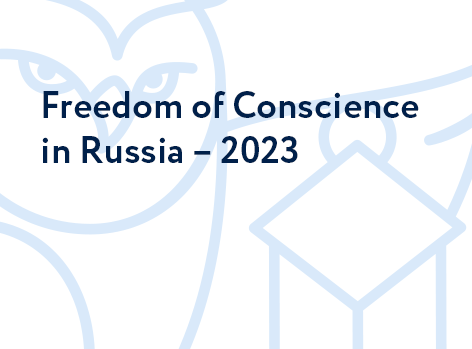Madam moderator, distinguished members of the conference,
1. Not for the first year the anti-extremist legislation remains one of the main sources of threats to freedom of conscience in Russia. Representatives of different religions, but more likely, different groups of peaceful Muslims and Jehovah's Witnesses are subjected to abusive persecution under the provisions of this legislation. At the moment, two of the followers of Said Nursi are serving the punishment of a real imprisonment for religious activities that do not pose any public danger.
The religious literature, mostly Muslim, of obviously not radical sense is regularly prohibited by the courts. For instance, recently there was recognized as extremist a collection of the Koran verses with commentaries, and it is obvious from the court’s judgment that the only motive for the decision was the assertion of the truth of Islam.
Russian anti-extremist legislation, as its counterparts in some former Soviet countries, is inefficient to solve the security problems, but contributes to restriction of freedom of religion. It leads to discrimination of Muslims and creation of the enemy image in their face, which is fraught with destabilization of the situation.
2. Xenophobia toward representatives of new religious organizations, unfortunately, is often supported by government officials and law enforcement officers, using negatively colored "anti-sectarian" rhetoric and abusing administrative pressure on these organizations. Unjustified accusations of extremism against these organizations do not also contribute to forming of tolerant attitudes toward them, but increase the level of anxiety in society.
3. There were adopted amendments to the law on freedom of conscience in Russia last summer. According to them, the religious groups, that are not planning to register as organizations, are obliged to inform the authorities about the basics of their religion, places of where their ceremonies are performed and even the information about all members of the group. Such a rule is contrary, inter alia, to norms on the protection of personal data. It is unclear which groups of believers will be considered by the authorities as required to file the information.
Apparently, these amendments were made to the law also for security reasons following the example of some other countries, such as Kazakhstan, but they will be counterproductive in this sense too.
4. Building of the churches, mosques and other houses of worship is always the subject of a compromise between representatives of religious communities, municipal authorities and local population. Unfortunately, in many Russian regions, primarily in Moscow more and more frequently such a compromise cannot be reached and the construction of temples is often accompanied by conflicts. Orthodox communities, despite the legislation, get allocation of sites within the park areas, which, naturally, causes protests of the local population, but the authorities often ignore the violations of law. Meanwhile, the Muslims with the evident shortage of mosques in Moscow cannot obtain a construction permit for several years, and the officials motivate their refusal by dissatisfaction of the local population.
This explicit support of the interests of one religious organization to the detriment of the rest of society is perceived as discrimination and entails the growth of tension in the society.
Our recommendations for OSCE participating states:
1. Do not use lists of banned literature as an instrument for protecting tolerance, including religious tolerance as this tool has already demonstrated a complete lack of efficiency, and it generates a lot of human rights violations.
2. Accept the fact that religious tolerance should be protected by the same mechanisms as other forms of tolerance, and refrain from creating special rules that restrict certain freedoms for the sake of specifically religious tolerance.
3. Disavow any and all laws that interpret religious polemics as incitement to religious hatred, and to revise the previously adopted solutions reflecting this spirit.
4. Develop an effective mechanism for adopting decisions on the construction of religious buildings.
5. Refuse the requirements
to informal communities of believers to give their information to the public
authorities if only they are not claiming any official status.


